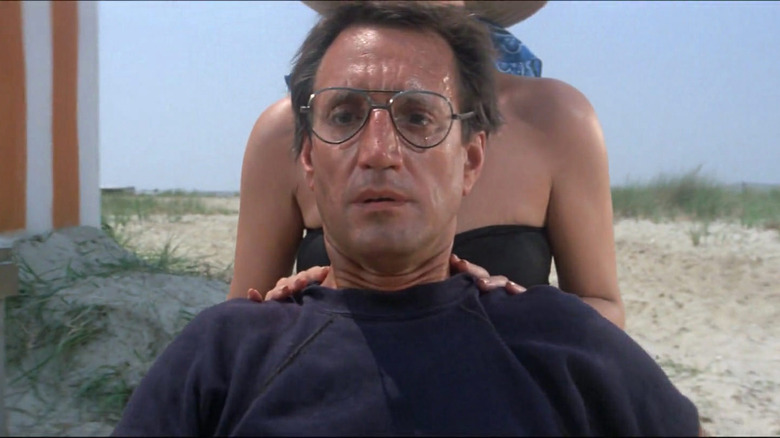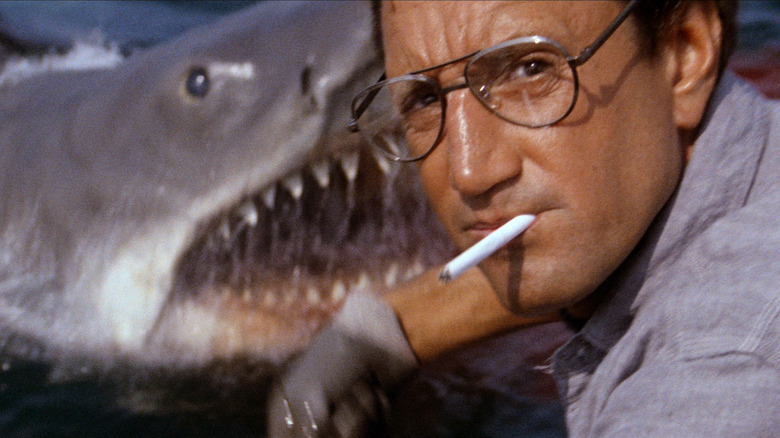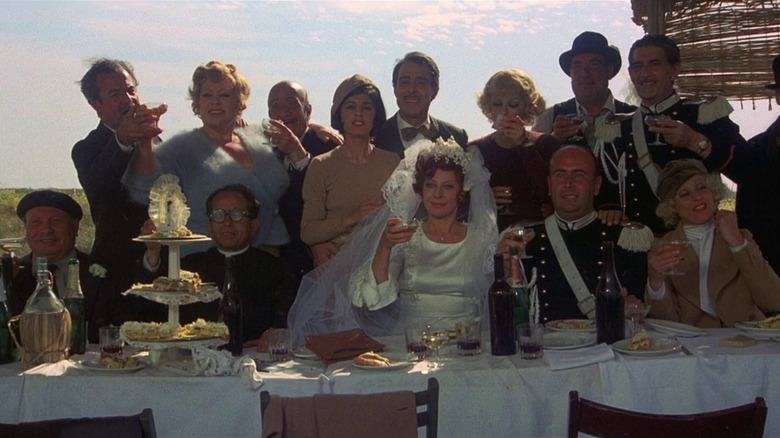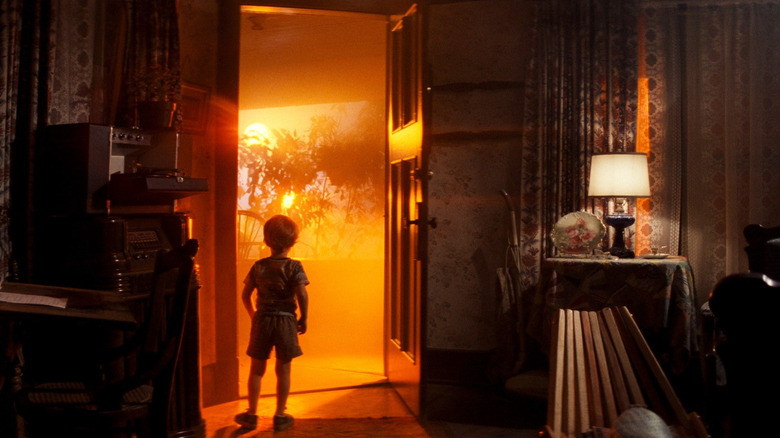
(Welcome to Did They Get It Right?, a series where we take a look at an Oscars category from yesteryear and examine whether the Academy's winner stands the test of time.)
One of the greatest pieces of cinematic ephemera in history is the video of Steven Spielberg reacting to nominations announcement for the 1976 Academy Awards. He was so confident that the world-conquering success of "Jaws" would lead to a clean sweep nomination morning, which would include a Best Director nomination for himself at just 29 years old, that he brought in a video crew to document the celebration. This did not happen. Instead of the 11 nominations Spielberg was predicting, it managed only four, though one of them was for Best Picture. He was shut out of the Best Director category, being the only director of a Best Picture nominee that year not to get a nod.
That fifth slot instead went to Italian arthouse auteur Federico Fellini for his partially autobiographical nostalgia dramedy "Amarcord," leading to Spielberg's cry of "I got beaten out by Fellini!" Considering Spielberg is in the Oscars race again this year with his own look back at his childhood with "The Fabelmans," it's now as good a time as any to go back to that morning in early 1976 and wonder how he could have made such a game-changing, successful film that we still all adore today yet earn the cold shoulder from the Academy. It seems crazy, but in the context of the Oscars in the mid-1970s, maybe it isn't as surprising as it seems.
'Everybody Loves A Winner, But Nobody Loves A WINNER'

For as wildly successful and beloved as the work of Steven Spielberg has been over the last 50 years, the tactile recognition he has received has not exactly equated to the financial and cultural impact he has made. Only one of his films, "Schindler's List," has ever taken home the Oscar for Best Picture, and both of his Best Director wins came after several decades in the business, which he won in rather quick succession. It's been nearly 25 years since he's taken home an Oscar. But it goes beyond the Oscars. Just take a look at this year's Sight & Sound poll of the 100 Greatest Films of All Time. Not a single Spielberg film appears on the critics' list and just one ("Jaws") shows up on the directors' poll.
In that Oscars nomination reaction video, a fresh-faced Steven Spielberg says:
"Everybody loves a winner, but nobody loves a WINNER."
While this sentiment does demonstrate the man's ego (give him a break, he was in his 20s), there is some truth in that. I think because his films have been so successful, and cultural touch points for several generations, Spielberg often gets taken for granted in respect to his preternatural cinematic craftsmanship. In some respects, this is Don Draper yelling at Peggy Olson, "That's what the money is for!" He is a commercial filmmaker, and some don't want to acknowledge artistry within a commercial enterprise. And back in 1975, with the New Hollywood in full swing, "Jaws" was essentially a B-movie that had been elevated to an A-movie, obscuring its artistry even more. The Academy collectively could see its merits to give it a Best Picture nom, but the directors weren't as keen to acknowledge it.
A Consistent International Director Presence

Here's the thing about Steven Spielberg losing out on a Best Director nomination for "Jaws." He wasn't passed over for some no-name schmuck who made a flash in the pan hit. No, he was passed over for one of the medium's great artists, Federico Fellini. Whereas Spielberg was a new man on the scene, Fellini had two decades of Oscar success behind him. "Amarcord" was his fourth nomination for Best Director and fourth win for Best International Feature. Every single time he was nominated, his film did not receive a Best Picture nomination. This reveals that the directors' branch of the Academy showed quite an affinity for the Italian auteur, and based on that history, it would be a little silly to ever count him out of the race.
The 1960s and '70s saw a substantial increase in the number of directors getting nominated for films that were not shot in English. In each decade, eight of the 10 years featured at least one international nominee, which included the very first woman nominated in the category: Lina Wertmüller for "Seven Beauties." This was a time in filmmaking where pockets of boundless creativity were popping up anywhere, and if any branch of the Academy was going to be receptive to this, it was the directors. After all, this was the age of the rise of the auteur theory, and directors wanted to recognize other directors for creating these personality-driven, idiosyncratic works. It is this mentality that explains why every single year in those two decades — with the exception of the 1965 Oscars — that the Best Picture and Best Director line-ups never matched up perfectly. The directors were perfectly content with going their own way, and that year, Federico Fellini was their guy. And who can blame them for that?
An Odd Correction Two Years Later

Even though he didn't get a nomination for Best Director for "Jaws," he still had an industry-altering hit under his belt and had the ability to make whatever he wanted. Two years later, he released "Close Encounters of the Third Kind," which I consider to be his best film. It was — once again — a massive success (though not the highest grossing film of the year thank to a little movie called "Star Wars"). This saw Spielberg working on a much bigger scale and making something truly awe-inspiring. This time around, the directors' branch couldn't ignore him, and Steven Spielberg got his much deserved first nomination for Best Director.
However, "Close Encounters of the Third Kind" missed out on a Best Picture nomination. He was the Federico Fellini of this Oscars, spoiling the five-for-five Best Picture/Director crossover. Another Richard Dreyfus-led film ended un snagging that fifth Picture slot, "The Goodbye Girl," for which Dreyfus won Best Actor. The wrinkle here is that "The Goodbye Girl" was directed by Herbert Ross, and he also directed another Best Picture nominee from that year, "The Turning Point," which got Ross his Director nomination. Unless the directors branch was going to nominate Ross twice in the same category, which they have only done three times in the history of the Academy Awards, that spot was going to open up.
It's strange to perceive Steven Spielberg as under-appreciated, but in terms of the Academy Awards, he kind of is. Because his films are so beloved, I believe everyone assumes that an overwhelming consensus will automatically get him into the winner's circle, and consequently, they don't vote for him. In everyone's mind, Spielberg's already a winner who has it all. However, he doesn't have as much as you think.
Read this next: Every Steven Spielberg-Directed Horror Movie, Ranked
The post Why Was Steven Spielberg Not Nominated For Best Director For Jaws? appeared first on /Film.
0 Commentaires